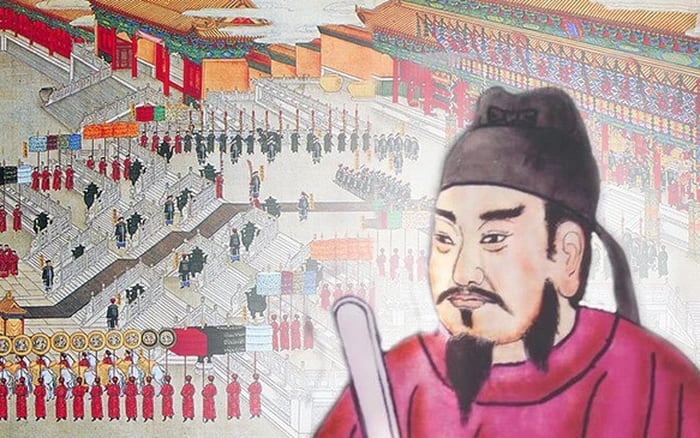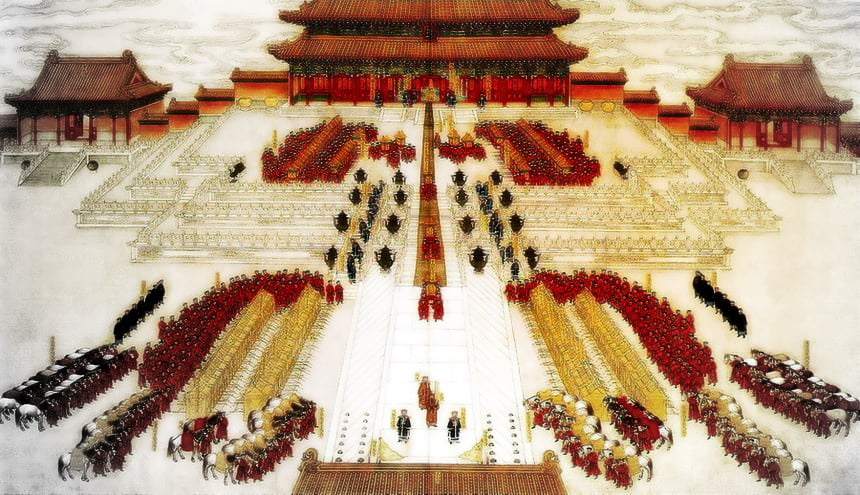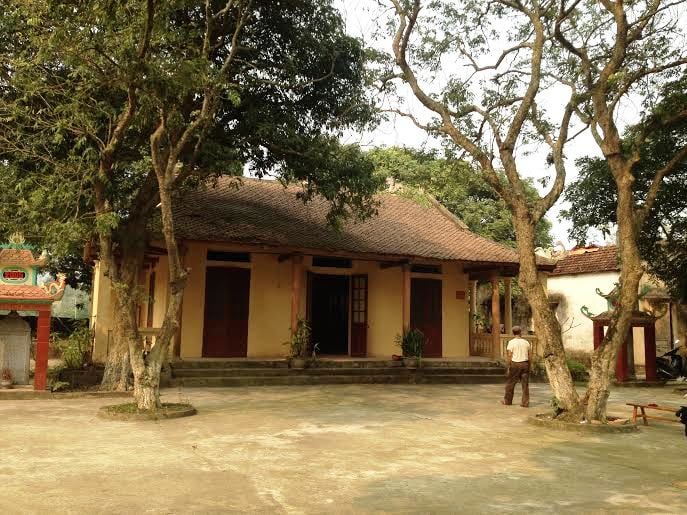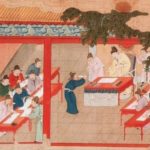Khương Công Phụ, also known as Đức Văn, left a deep mark in the history of An Nam as a Prime Minister under the reign of Emperor Đường Đức Tông. According to the “Đại Việt sử ký toàn thư” (Complete Annals of Đại Việt), he was born and raised in Sơn Ổi village, Cổ Hiển commune, Quân Ninh district, Ái Châu county, Cửu Chân region – now Tường Vân village, Định Thành commune, Yên Định district, Thanh Hóa province. His career began when he was appointed as a “Hiệu thư lang” by Emperor Đường Đức Tông. From there, he continued to rise through the ranks, becoming a “Gián nghị Đại phu” and finally a “Tể tướng,” contributing to the development of the country.
From a talented young boy in An Nam to a Prime Minister in the north
Based on information from the Khương clan genealogy in Yên Định, Thanh Hóa, the two characters Khương Công Phụ and Khương Công Phục are identified as the sons of Khương Công Đĩnh, and the grandsons of Khương Thần Dực – a person who held the position of Thứ sử in the Ái Châu region (now Thanh Hóa). According to research and compilation from the Thanh Hoá Historical Figures Committee along with the book “Giai thoại Lịch sử Việt Nam” (Legends of Vietnamese History), Khương Công Phụ stood out from a young age with his intelligence and remarkable memory.
According to tradition, when Khương Công Phụ was still a child, his father, Khương Công Dĩnh, recognized his early intelligence and was overjoyed. He found a person skilled in interpretation and opened a traditional medicine shop near their home for him to study. Khương Công Phụ’s rapid progress surprised and impressed his teacher. He memorized the Four Books, the Five Classics, and understood the meanings in Confucian texts.

Before being selected to attend the imperial capital of Trường An for the examination, Khương Công Phụ had to pass many rigorous preliminary rounds. Whether it was in the field of history or poetry, Khương Công Phụ’s work was always complete and excellent. Khương Công Phụ was ranked at the top of the list of 8 candidates representing the 8 districts of Giao Châu province who went to Trường An for the examination, during the reign of Emperor Đường Đức Tông (780 – 805).
At this important examination, Khương Công Phụ excelled and became the first Vietnamese Trạng nguyên (highest academic title) in China. Emperor Đường granted him the position of Hiệu thư lang as a special honor. Afterwards, Khương Công Phụ presented a paper titled “Kế sách trị nước” (Governance Strategies) with many creative and outstanding ideas. Emperor Đường Đức Tông greatly respected and appreciated his contributions.
Thanks to his exceptional governance strategies, Emperor Đường awarded Khương Công Phụ the title of Hữu thập di Hàn Lâm học sĩ (Scholar of the Hanlin Academy) and appointed him as Kinh triệu hộ tào tham quân (Imperial Commissioner and Military Inspector). Khương Công Phụ’s political career continued to advance, from the position of Gián nghị Đại phu to ultimately becoming the Tể tướng, making him the only Vietnamese person to hold the title of Trạng nguyên and the position of Tể tướng in China.
In the grand flow of the nation’s glorious history, we cannot ignore the outstanding Trạng nguyên, the intellectuals who left a deep mark in the national consciousness with their brilliant intelligence and profound knowledge. Especially when they were sent as envoys to China, they were not only recognized for their talents by the Chinese emperor but also awarded the title of Trạng nguyên, creating a glorious history with the name “Lưỡng quốc Trạng nguyên” (Dual Country Trạng nguyên). Notable figures among them include Mạc Đĩnh Chi, Nguyễn Đăng Đạo… They contributed to the flourishing of Vietnamese culture and left a mark in the hearts of both nations’ people.
According to the work “Việt Nam cổ văn học sử” (Ancient Vietnamese Literature and History) by Nguyễn Đổng Chi, before Khương Công Phụ and his brothers appeared, Vietnam already had Phùng Đái Tri, who had passed the examination in the North. Phùng Đái Tri’s poetry, written together with a person from Đột Quyết, was praised by Emperor Đường Cao Tổ (618 – 626) as “Hồ Việt nhất gia” (The most talented poet in Vietnam).
However, only Khương Công Phụ, a notable historical figure, could hold the position of Tể tướng – the highest position in the court of China in history.

Straightforward and fearless in the face of power
In the work “Tân Đường thư” (New Tang Prose), Âu Dương Tu described Khương Công Phụ as a person with extraordinary talents, always clearly expressing himself on every occasion and highly regarded by Emperor Đường. Khương Công Phụ had a straightforward and fearless personality, unafraid to participate in discussions with the emperor and the exercise of power. While holding office, he made constant efforts to fulfill his responsibilities.
According to the “Đại Việt sử ký tiền biên” (Preliminary Records of the Great Đại Việt Dynasty), whenever Khương Công Phụ had an audience, he presented his ideas clearly and logically, earning respect from Emperor Đường. Gradually, he was promoted to the position of Gián nghị Đại phu, and later to the position of Đồng trung thư môn hạ Bình Chương sự. Thanks to the bravery and intelligence of Khương Công Phụ, Emperor Đường was able to escape from many major disasters. He once advised Emperor Đường to kill Chu Thử due to suspicions of his rebellious intentions. Although this advice was initially ignored by Emperor Đường, when Chu Thử did rebel, Emperor Đường remembered Khương Công Phụ’s warning and was able to avoid being harmed.
In 784, amidst ongoing military turmoil, Khương Công Phụ spoke out when he saw Emperor Đường Đức Tông organizing a funeral ceremony and building a tower for Princess Đường An. He advised the emperor to focus on supporting the military to ensure the stability of the country. However, Emperor Đường Đức Tông did not agree with this advice and demoted Khương Công Phụ to the position of Tả thứ tử, responsible for teaching the crown prince. During this time, Khương Công Phụ’s mother passed away, and he was granted leave to return to his hometown to mourn.
In the year Quý Dậu (793), Khương Công Phụ, a respected historical figure, was demoted and banished to Tuyền Châu. However, a significant event occurred in 805, when Emperor Đường Đồng Thuận ascended the throne. Recognizing the fairness of Khương Công Phụ’s advice, the emperor appointed him as Thứ sử Cát Châu.
However, life did not go as he had hoped. Khương Công Phụ, already old and weak, passed away before being able to assume the position. During the reign of Emperor Đường Hiến Tông, he was posthumously appointed as “Lễ bộ Thượng thư” (Minister of Rites), a great honor, to commemorate his contributions to the country.
An unwavering love for the homeland
Even as an official in a foreign land, Khương Công Phụ never forgot his homeland. This deep love was demonstrated through his valuable contributions to Vietnamese literature. Although the number of his works may not be many, the phú poem “Bạch vân chiếu xuân hải” left a deep impression and became the first literary work to meet the standards of the Hán language.
This phú poem has been highly praised by scholars and literary researchers, seen as a pioneering work that ushered in a new era for Hán literary works in Vietnam. Particularly, it is the earliest surviving phú poem in Vietnam’s rich literary heritage.
Yên Định, Thanh Hóa, the hometown of Khương Công Phụ, is famous for its vibrant scholarly tradition, alongside Hoằng Hóa in producing exceptional talents. This has been recorded in the “Thanh Hóa quan phong” (Thanh Hóa’s Notable Figures), a literary work full of emotion, with verses praising: “Từ xưa quốc thái linh linh/Tả long hữu hổ kéo quanh chầu về” (Since ancient times, there has been an abundance of talents in the country).

According to the Thanh Hoá Historical Figures Committee, the hometown of Khương Công Phụ is located in thôn 6, Tường Vân village, Định Thành commune, Yên Định district. This is the place that witnessed important historical events. In the years of Cảnh Hưng (1740) during the reign of Emperor Lê Hiển Tông, and in 1870 under the reign of Emperor Tự Đức, a temple was built to commemorate Khương Công Phụ. In 2001, this temple was recognized as a national historical – cultural relic, a symbol of respect and gratitude for Khương Công Phụ’s contributions.
































